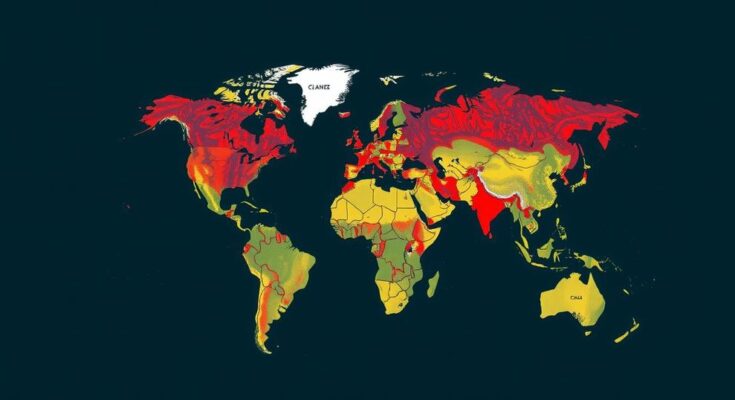The COP29 climate summit has extended beyond its deadline as nations negotiate climate finance commitments. Wealthy nations propose increasing commitments to $300 billion, but developing countries seek a minimum of $1 trillion annually by 2030 to address climate needs. Pakistan faces a climate finance gap of $348 billion, underscoring the disparity in commitments and needs. The negotiations highlight a larger issue of responsibility between developed and developing nations.
The ongoing COP29 climate summit in Baku has extended beyond its scheduled deadline, with negotiations concerning climate finance persisting into overtime. An essential point of contention has been the establishment of a New Collective Quantified Goal for climate finance, with significant disagreement between developed and developing nations. While wealthy nations have tentatively proposed raising climate finance commitments to $300 billion, developing countries assert that a minimum of $1 trillion annually by 2030 is necessary to address climate challenges effectively, a stark contrast that highlights the urgency of these discussions.
Pakistan exemplifies the dire situation, as it faces a staggering climate finance gap of $348 billion by 2030. The disconnect between the commitments of wealthy nations and the desperate needs of developing nations remains pronounced. Delegates from poorer nations have expressed feelings of being inadequately compensated, with some like Sierra Leone considering withdrawal from discussions. The complex dynamics are further compounded by differing views on responsibility for emissions, particularly regarding high-emitting economies such as China and Gulf states.
The recent political climate in the United States, including the election of Donald Trump, has cast uncertainty over these negotiations, as concern arises that the U.S. may not support the finance goals. Pakistan’s delegation, led by negotiator Arif Goheer, has articulated disappointment with the draft agreement. Pakistan’s Prime Minister Shehbaz Sharif has emphasized the need for grants instead of loans to prevent exacerbating debt issues. Pakistan has also introduced domestic initiatives to combat climate vulnerabilities, yet these require significant financial support.
Overall, the intricate bureaucratic hurdles associated with accessing any potential funds only seem to deepen the challenges faced. Although some funds may eventually be unlocked, the overarching reality is that climate finance transcends mere monetary contributions; it fundamentally relates to assisting vulnerable nations in coping with a crisis they did not significantly contribute to. Until tangible progress is made in aligning commitments with the pressing climate realities, the path forward remains uncertain.
The issue of climate finance is pivotal in global discussions at climate summits, particularly in the context of the COP proceedings, where nations negotiate commitments to mitigate climate change impacts. Developed countries, historically responsible for high greenhouse gas emissions, have faced pressure to provide financial support to developing nations, which suffer the most from climate change despite contributing minimally to the problem. The disparity in perspectives between the Global North and South complicates discussions around who should bear the financial responsibility, especially in light of the differing economic and environmental contexts. The urgency of these negotiations is underscored by the critical funding needs identified by various countries, such as Pakistan, which highlight the immediate requirements for climate adaptation and resilience.
In conclusion, the COP29 summit reflects a critical juncture for climate finance negotiations, wherein the stark contrast between the financial needs of developing nations and the commitments offered by developed nations is evident. As discussions continue, it is imperative for the international community to acknowledge that climate finance is about more than financial figures; it is about providing equitable support to enable vulnerable nations to withstand climate crises. The pathway to genuine climate action hinges on the willingness of wealthy nations to meet their responsibilities, ensuring that developing countries are not left to confront these challenges alone.
Original Source: asianews.network




